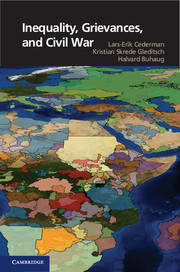Book contents
2 - Inequality and Grievances in the Civil War Literature
Published online by Cambridge University Press: 05 June 2014
Summary
This chapter surveys the literature on the link from inequality and grievances to civil war violence. As will become clear, the perceived validity of such factors has remained controversial in conflict research. After considering the classical literature, as well as some of the more recent writings in this area, we turn to a critique of the literatures that inform our own theory-building efforts in Chapter 3.
Classical Contributions
Given the obvious relevance of power and wealth distributions as potential sources of conflict, it is not surprising that inequality plays a central role in classical theories of civil war and revolution. In an influential article, Davies (1962) argued that revolutions were motivated by frustrations resulting from an evolving gap between individuals’ aspirations and their actual economic status. Also adopting an explicitly psychological perspective, Ted Robert Gurr's (1970) well-known theory of relative deprivation characterizes various types of collective violence as reactions to frustrations stemming from unfulfilled aspirations, usually related to material well-being (see review in Brush 1996). Such a perspective differs radically from earlier sociological theories of mob behavior that explained collective violence as a societal pathology (e.g., Le Bon 1913). Instead, relative deprivation theorists argue that individuals’ widespread discontent with their social situation triggers conflict, especially where modernization fuels a “revolution of rising expectations” (Davies 1962).
- Type
- Chapter
- Information
- Inequality, Grievances, and Civil War , pp. 11 - 29Publisher: Cambridge University PressPrint publication year: 2013



